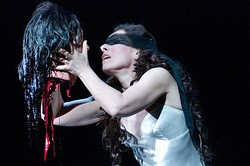
I’m talking about the Canadian Opera Company’s revival of Atom Egoyan’s production of Salome, which I saw on Saturday (April 27) afternoon at Toronto’s Four Seasons Centre.
| Dr. Colin Eatock, composer |
|
 Salome gets her wish. The opportunity to revisit an old friend is one of life’s most gratifying pleasures. And even if the friend in question is brutal, depraved and horrifying – well, a friend is still a friend, right? I’m talking about the Canadian Opera Company’s revival of Atom Egoyan’s production of Salome, which I saw on Saturday (April 27) afternoon at Toronto’s Four Seasons Centre.
0 Comments
 The CSO has extended Anna Clyne's contract. (Smart people!) I haven’t posted one of these “New Music I Like” blogs in a little while. But rest assured, gentle readers, I have been vigilant on your behalf – following up internet clues wherever they might lead. When I received a press release from the Chicago Symphony Orchestra announcing that Anna Clyne, one of two young composers-in-residence with the CSO, is having her contract extended, I promptly investigated. I’d never heard of Clyne before, so I turned to YouTube – and found some impressive music. While I can’t say I enjoyed everything I heard equally, I can only agree with conductor Riccardo Muti’s assessment that she is “an artist who writes from the heart.” 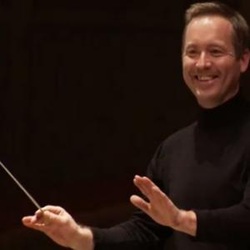 Simon Capet strikes up the band. There’s always a mixture of emotions in the air when a new ensemble is officially launched. Eagerness, optimism, curiosity and even a touch of skepticism occupy the same space simultaneously. And so it was at the Lula Lounge last night when Euphonia – a chamber orchestra assembled by conductor Simon Capet – stepped out for their first public performance. As some readers may be aware, the Lula Lounge is a funky club in downtown Toronto that’s best known for its adventurous world music programming. Western classical music hasn’t had a large presence in the past – so Capet’s ambitious announcement that his orchestra would play there on a regular basis came as a pleasant surprise. 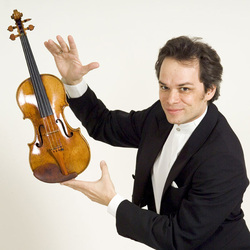 Benjamin Schmid and the Lady Jeanne. Here’s an interview with violinist Benjamin Schmid that I wrote up for the Houston Chronicle. We talked about his violin, the “Lady Jeanne” Strad. Austrian violinist Benjamin Schmid will be in Houston this week, for a return engagement with the Houston Symphony. And when he steps off the plane, he’ll be carrying something very special. Along with clean socks and underwear, Schmid is bringing a Stradivarius violin, made in 1731 – and worth between $4 and $5 million dollars. This is the instrument he’ll use to play works by Felix Mendelssohn and Fritz Kreisler on Thursday, Saturday and Sunday at Jones Hall. 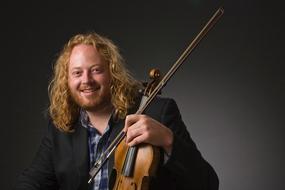 Huizinga is Toronto's leading classical revolutionary. Of late, there’s been an outbreak of bad music in Toronto. No, wait a minute, that’s not right. In fact, most of the music in question is actually very good. Rather, I should say it’s the performances that are bad. But that’s not quite fair, either. It’s more accurate to say the performances are “variable.” Sometimes things go well – and at other times, not so well. 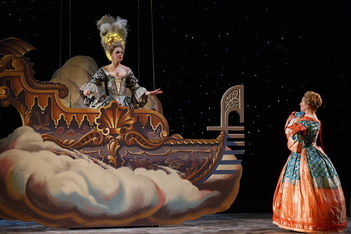 Ambur Braid as the Queen of the Night, and Laura Albino as Pamina. Opera Atelier’s English-language production of The Magic Flute – which opened last night at Toronto’s Elgin Theatre – takes its audience on a journey back in time. I don’t just mean that it harks back to 1791, when Mozart’s Singspiel was first performed in Vienna. I mean that it takes Opera Atelier’s audience back to an earlier era, when OA’s sets and costumes were more focused on pomp and splendour than they tend to be these days. The elaborate hooped skirts and brilliant trompe l’oeil scenery were brought out of storage for the third time since Atelier first staged the work in 1991, serving as a reminder of the company’s aesthetic roots.  Thre's nothing good about a bad performance. Thre's nothing good about a bad performance. Over on NewMusicBox there’s a blog by Alexandra Gardner that’s touching the sensitive nerves of many readers (see here). In it, she discusses several questions surrounding bad performances of new music. Are such performances truly harmful to composers? And what should a composer say, do and think when performers make a hash of a new piece? While the responses vary substantially, taken collectively they are an attempt to deal with a special kind of pain that all composers have faced at one time or another. I know I have. And, as a result, Gardner’s questions, and the subsequent responses have brought a flood of thoughts to my mind. I’ll try to share them in a clear and organized fashion. |
Eatock Daily
I'm a composer based in Toronto – and this is my classical music blog, Eatock Daily. Archives
May 2024
Index
Click here for an alphabetical list of blog entries.
|